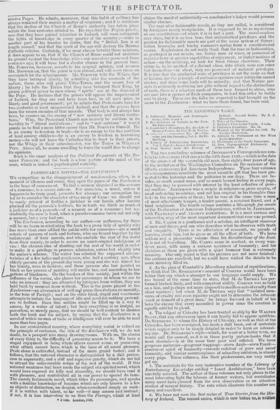FASHIONABLE - NOVELS—THE EXCLUSIVES.* WE sympathize in the disappointment of novel-readers,
when, in a moment of idleness and ennui, they open the pages of the Exclusives in the hope of amusement. To find a sermon disguised in the colours of a romance, is a severe take-in. For ourselves, a novel, unless it happens to be truly good, presents few charms ; our occupation has led us to consider the character of too many of them : we should not be sorely grieved at finding a jackdaw in our hands after having plucked off the peacock's feathers, for in truth we think as much of a jackdaw as of a peacock—of a sermon as of a romance ; but un- doubtedly the case is hard, when a pseudo-romance turns out not only .#_sermon, but a very bad one. Y The Exchtsives, according to our author—or authoress, for there ,will be no harm in attributing the book to a prosy lady of quality who has more I han once edified the public with her romances—are a small
• k coterie of persons of rank and fortune, who are bound together by the indifference of their morals, and who exclude the rest of the world from their society, in order tc secure an uninterrupted indulgence of
i vice : the obvious idea of shutting out the rest of the world in order ; to make it a privilege to procure admission, enters but slightly into ; the author's scheme. The writer has selected ihe supposed chum- ( teristics of a few ladies and gentlemen, who half a century ago, when 1 elderly persons of the present day were young and she was famed for e . L....her beauty, were in fashion ; and these persons she has painted as .. black as her powers of painting will enable her, and according to her notions of blackness. On the borders of this society, just within the influence of the vortex, she places her personages in whom we are to take an interest : they are attracted by intrigues from within, they are held back by sermons from without. This is the game played in the Exclusives—an alternation of dull aril prosy dissertations on morality, in the tone of Turtufie; and on the other hand, stupid and wearisome attempts to imitate the language of idle and good-for-nothing pretend- ers to fashion. Even this outline might be filled up in a way to amuse, by a writer of talent; but here everything is so insipid, so powerless, so merely prosy, that we should be well content to dismiss both the book and the subject, by saying that the Exc/usives is a novel of which no man of taste or intelligence will ever be able to read more than two pages. In our aristocratical country, where everything social is valued on the principle of exclusion, the title of the Exclusives will, we do not doubt, be a passport into many drawing-rooms. With us, the charm of every thing is, the difficulty of procuring access to sit. We have a stupid enjoyment in being where others cannot come, or possessing what others cannot have, which is the bane of all social pleasure. Pride alone is cultivated, instead of the more genial tastes ; and it follows, that the national character is distinguished by a dull preten- sion to superiority, and a stiff and repulsive gravity, which do not fail to attract the unfavourable notice of the rest of the world. If this national weakness had been made the subject of a spirited novel, which would have exposed its folly and absurdity, we should have read it with pleasure, and contributed all in our power to. spread its fame. The merelyfashionable novel, which titles its personages, and speaks with a familiar knowledge of luxuries which are only known to a few as objects of distinction, we despise, when considered simply as such : if it is written with talent, so far well—it may amuse and instruct ; if not, it is less interesting to us than the Peerage, which at least .1r. 3 vols. London, 10329,
claims the merit of authenticity—a coachmaker's ledger would possess similar charms.
The rage after fashionable novels, as they are called, is considered by foreigners nearly inexplicable. It is supposed to be as mysterious as our constitution—of which it is in fact a part. The novel-readers may stare, but it is no less true, that aristocratical privileges and the passion for fashionable novels are part of the same system of things: rotten boroughs and trashy romances spring from a constitutional source. Englishmen do not really think that the race of fashionables, as portrayed in our novels, are better men or wiser, or possessed of
iperior taste or greater capabilities of enjoyment, or higher motives of action—on the contrary, we look for these things elsewhere. Their virtue is, to be marked of a distinct class, into which none can enter but themselves—in short, they are possessed of national privileges. It is true that the graduated scale of privileges is not the same as that of fashion, for the principle of exclusion operates even withintlie sacred circles ; and since some lords will be unlordiy, and that Nature per- sists in arbitrarily scattering her gifts without regard to the distinctions of rank, thsre is a selection made of those best formed to shine, who are cast into a species of flank companies, to lead this order to battle and to glory. These are the folks we expected to find brought on the scene in the Exchssives: what we have there found, has been said.


















 Previous page
Previous page